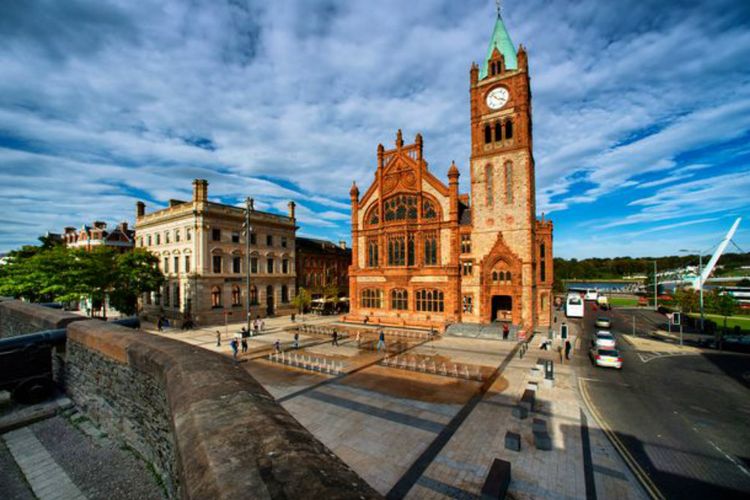Derry

From the moment you pass the city´s second most famous wall at Free Derry Corner, inscribed with the immortal words, “You are now entering Free Derry,” you realise you are visiting a city steeped in history. And the story has only just begun.
The writing was etched on the gabled walls of a house in 1969 to mark the starting point of a no-go area the British Army were not permitted to cross, and though the streets and the majority of its buildings have since been demolished the wall remains as a significant reminder of the conflicts the city has endured.
But the trauma of the past is well and truly behind the people of Derry, known as Londonderry to the British, and a massive program of urban redevelopment has seen the city flourish, so significantly is has been named as the UK´s City of Culture for 2013. Perfectly planned and thoughtfully compact, the city has a whole host of attractions to explore and a wealth of history to discover.
A good starting point is the award-winning Tower Museum which documents the city´s history from its ancient origins in 542 through to the civil unrest which broke out against the British in 1969 and the subsequent call for peace in the 1990´s. Learn about the siege in 1689 that lasted for 105 days, the longest in the history of the British Isles. Elsewhere in the city you can also explore the city walls from behind which 8000 inhabitants lost their lives during the siege. Admission is free of charge.
More of the fascinating moments of history can be found at the Free Derry Museum which chronicles the history of the Battle of Bogside, the civil rights movement and the tragic events of Bloody Sunday when 14 innocent civilians were gunned down by British troops in 1972. It proved to be a turning point in the ´Troubles,´ a granite obelisk to commemorate the dead is another touching attraction.
The most famous attraction
Another major draw for visitors to this area of the world is a short drive from Derry in neighbouring County Donegal, the Giant´s Causeway. The unusual natural phenomenon is an area of some 40,000 interlocking basalt columns which were left as a result of an ancient volcanic eruption and has since been classed as a UNESCO World Heritage Site.
Derry also has a rich nightlife scene with lively bars and warm, cosy pubs hosting traditional music nights and plenty of banter with the witty and welcoming locals, who themselves are an attraction of their own.
Travelling to Derry by Ferry
There are a few direct ferries from both Scotland and England to the Belfast region of Northern Ireland from there it’s about an hour and half drive to Derry. If you are coming from the south of England or Wales area then you may take one of the many Republic of Ireland ferries which leaves you with 3-5 hour drive to Derry.